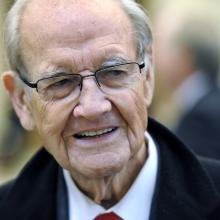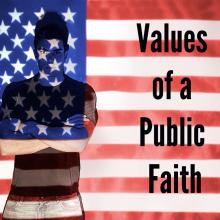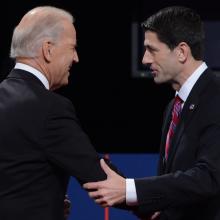election 2012
As the winds and the rain of Hurricane Sandy settle down, one bit of the aftermath is going to be another round of conversation about how climate change is affecting our world.
It’s not a conversation you have heard much of in the presidential campaign this year. Climate change is one of a quartet of issues that will have a huge impact on the future of this nation that have gotten short shrift by both President Barack Obama and Gov. Mitt Romney.
Poverty. Guns. . Drones. Climate change.
Bring up any of those issues and watch the candidates make a quick nod of concern and then scamper away from any specifics. Yet those issues will be with us long after Nov. 6, so it is incumbent on those of us in the faith community to be laying the groundwork now for how we will address them in the coming year.
That work has already begun, of course. The challenge is not to let the post-election exhaustion sweep away those concerns like they were potted palms on a pier in the midst of the hurricane.
It seems so easy, doesn’t it? Love God. Love your neighbor. The two greatest commandments encapsulate the core of faith and could — if we really were to trust God — transform the world.
Similarly then and with election day looming, voting should be an easy affair: people of faith should vote for the candidates whose policies would most embody a love of God and neighbor.
It seems so easy, but it isn’t if we are honest with ourselves and gracious towards those who disagree with our political persuasions. No single party or candidate has a monopoly on loving God and neighbor. Moreover, people of passionate faith and commitment to the values Jesus commends in Mark 12:28-34 so often can’t even agree on what these seemingly simple commandments mean.
Such disagreements about what it means to love God and neighbor are at the very center of so many of our political debates.
Some Christians will vote for President Obama, arguing that the most loving thing we can do for our neighbor is to build a stronger social net. Some Christians will vote for Mr. Romney, arguing that the most loving thing we can do for our neighbor is let loose the power of the market to create good-paying jobs for all. Some Christians will cast a ballot for Mr. Romney in support of his stance on abortion. Some Christians will cast a ballot for President Obama, noting that the availability and affordability of basic health care is a pro-life position.
All of us, if we are honest, will vote for a flawed candidate.
Breaking a1e longstanding personal pledge, Southern Baptist leader Richard Land has endorsed GOP presidential nominee Mitt Romney, saying next week's election is the most important since Abraham Lincoln's win in 1860 and he can no longer stay silent.
“America is at a fork in the road and must choose between a President Barack Obama who wants to remake America in the model of a European welfare state and a Governor Mitt Romney who wants to restore a more economically vibrant and traditionally moral America,” Land wrote in an Oct. 26 column in the Christian Post.
Land, who is executive editor of the independent Christian Post and the top public policy spokesman for the SBC, said the “stark and revealing” differences between the Republicans and Democrats on abortion rights and same-sex marriage guided his decision.
“For Christians of traditional religious faith, there cannot be more fundamental issues than the protection of the sanctity of all human life from conception to natural death and the defense of marriage as a divinely-ordained institution between one man and one woman,” he wrote.
Land’s endorsement comes just as Romney's campaign has been trying to cast the candidate in a moderate light by downplaying the Republican’s views on abortion and gay rights and saying voters should not expect him to take significant action on those social issues if he is elected.
Of all the ugliness in Election 2012, nothing is more disturbing than attempts to prevent people from voting. Voter suppression strikes at the very heart of American democracy.
The flood of money into this year's campaigns has been bad enough, as wealth has sought to do what wealth usually seeks to do: gain control and preference.
The shouting of lies – not just shading the truth, but outright lies – has cheapened the liars and insulted the public.
Demagogic attacks grounded in religion, phony patriotism and race have undermined public trust in all politicians. It will take years to dig out from under the rot of such scorched-earth tactics.
But denying the basic right of citizenship to millions of voters is an offense we should all be protesting. For if the powerful can deny the vote to their opponents – especially the poor and people of color – they can deny the vote to anyone.
Pollsters and politicians hunting for the rare and elusive undecided voter might want to train their sights on the pulpit.
A whopping 22 percent of Protestant pastors haven’t settled on a presidential candidate, according to a survey released earlier this month by LifeWay Research. By comparison, just 4 percent of all likely voters remain undecided, according to Gallup.
The undecided pastor trend doesn’t appear to be a one-time fluke. A similar survey conducted in October 2008 also found that 22 percent of pastors hadn’t chosen between Obama and then-GOP nominee Sen. John McCain.
The survey of 1,000 Protestant pastors was conducted Sept. 26-Oct. 3 by LifeWay Research, a division of LifeWay Christian Resources, which was founded by the Southern Baptist Convention.
Pursued by politicians, mocked by "Saturday Night Live" and barely tolerated by partisans, undecided voters get a bum rap. But there are good reasons for pastors to remain ambivalent until Election Day, experts said.
TONY CAMPOLO: Shane, I have a question to ask that may make you squirm a little bit. From hearing you talk and reading your books, you often seem to suggest that Christians not participate in the political process, and that political activism is somewhat futile. Have I understood your position correctly?
SHANE CLAIBORNE: The question for me is not are we political, but how are we political? We need to be politically engaged, but peculiar in how we engage. Jesus and the early Christians had a marvelous political imagination. They turned all the presumptions and ideas of power and blessing upside down.
The early Christians felt a deep collision with the empire in which they lived, and with politics as usual. They carelessly crossed party lines and built subversive friendships. And we should do that too. To be nonpartisan doesn’t mean we’re nonpolitical. We should refuse to get sucked into political camps and insist on pulling the best out of all of them. That’s what Jesus did—challenge the worst of each camp and pull out the best of each. That’s why we see Essenes, Zealots, Herodians, Pharisees, and Sadducees all following Jesus and even joining his movement. But they had to become new creations. They had to let go of some things. Jesus challenged the tax-collecting system of Rome and the sword of the Zealots.
So to answer the question, I engage with local politics because it affects people I love. And I engage in national politics because it affects people I love.
Governments can do lots of things, but there are a lot of things they cannot do. A government can pass good laws, but no law can change a human heart. Only God can do that. A government can provide good housing, but folks can have a house without having a home. We can keep people breathing with good health care, but they still may not really be alive. The work of community, love, reconciliation, restoration is the work we cannot leave up to politicians. This is the work we are all called to do. We can’t wait on politicians to change the world. We can’t wait on governments to legislate love. And we don’t let policies define how we treat people; how we treat people shapes our policies.
TONY CAMPOLO: So you are not calling for noninvolvement in politics. Instead, you are warning Christians not to put their trust totally in political powers. You are calling them to exercise an ongoing involvement with the political process, to constantly speak truth to power in those places where power seems to be asserting itself in ways that are contrary to the will of God.
Late last week, President Barack Obama endorsed the same-sex marriage referendum on the Washington state ballot and also formally backed a similar measure on the ballot in Maine.
The support from the president -- who in May came out in favor of gay marriage -- on Oct. 25 provided a boost for the campaign in favor of Washington's Referendum 74 just as a new poll showed that the race was getting tighter.
The announcement came in a statement issued by Paul Bell, the Washington press secretary for Obama's re-election campaign:
"While the president does not weigh in on every single ballot measure in every state, the president believes in treating everyone fairly and equally, with dignity and respect. Washington's same-sex marriage law would treat all Washington couples equally, and that is why the President supports a vote approving Referendum 74."
Nearly nine in 10 Muslim American voters pulled the lever for the Democratic candidate in the last two presidential elections, partly because of Republican policies and rhetoric that many considered anti-Muslim. In 2008, they also thought President Obama would usher in an era in which Muslims would be more accepted at home, and relations between America and the Islamic world would see improvement.
But this year, Muslim American support for President Obama shows signs of waning, which could be enough to affect the 2012 election in key swing states where a few thousand votes could have a big impact.
Several of those swing states -- most notably Virginia, Michigan, Florida, Pennsylvania, Colorado, and Ohio -- have enough Muslim voters to turn a tight race, experts say.
According to a poll of 500 Muslim American voters released Wednesday (Oct. 24) by the Council of American-Islamic Relations in Washington, 68 percent of Muslims said they would vote for President Obama, while 25 percent were undecided. The poll, which had a margin of error of plus or minus 5 percentage points, also found that 91 percent of Muslims intend to vote.
Note from Jim Wallis: On October 25, Troy Jackson wrote this piece for God’s Politics. He called for a “media fast” on November 2 — today. I thought this was a compelling idea so I am putting it out there again. So Turn Down the Noise: Fast, Pray, and Vote — today or one of the days before the election. Read and heed.
I was a teenager when the rock and roll "documentary" Spinal Tap premiered. Like many in my generation, I love the scene when Spinal Tap member Nigel Tufnel (Christopher Guest) proudly shares with reporter documentarian Marty DiBergi (Rob Reiner) that the band's special amp has dials that go up to eleven:
"You're on ten here, all the way up, all the way up, all the way up, you're on ten on your guitar. Where can you go from there? ... Nowhere. Exactly. What we do is, if we need that extra push over the cliff, you know what we do?" Marty responds, "Put it up to eleven," and Nigel emphasizes the point: "Eleven. Exactly. One louder."
This election season, I have come to believe that Nigel was on to something. You see, here in Ohio we have seen political advertising go "one louder" and receive "that extra push over the cliff." The NOISE is so deafening, I'm convinced the campaigns and super PACs have discovered a way to turn the dial all the way up to 11!
I will miss George McGovern. The former senator from South Dakota and Democratic presidential candidate in 1972 died in a hospice on Sunday, at 90, surrounded by family and friends who loved him.
Indeed, many of us did.
1972 was the first year I was old enough to vote in an election, and McGovern was the first presidential candidate for whom I voted.
To this day, I am more proud of that vote than most of the others I have cast since.
Some of McGovern’s people contacted me while I was still at seminary during the 1972 campaign. They wanted McGovern to have a chance to meet and talk with evangelical Christians, since his own Christian faith was very important to him — being the son of a Methodist minister and even having studied for a divinity degree himself for a while before deciding to go into teaching history. I agreed to help.
They couldn’t understand why most evangelicals at the time were for Richard Nixon, a man who turned out not to be one of the U.S.'s most honest, humble, or deeply religious presidents.
In an OpEd that appeared on POLITICO Monday, Mike Huckabee, the former Republican governor of Arkansas, and Blanche Lincoln, the former Democratic senator from Arkansas -- who together co-chair ONE Vote 2012, a non-partisan campaign to make global health and extreme poverty foreign policy priorities in the 2012 presidential election, wrote about the importance of maintaining U.S. foreign aid to the developing world that has helped make significant improvements in the health and sustainability of myriad nations, including many on the continent of Africa.
They wrote, in part:
It might come as a surprise to learn that less than one percent of the U.S. budget is spent on foreign assistance. It might even be shocking to discover that, despite this relatively small amount, these funds are literally saving millions of lives and improving the lives of many more millions of people.
For example, American investments in cost-effective vaccines will help save nearly 4 million children’s lives from preventable diseases such as pneumonia and diarrhea over the next five years. We’ve also helped to deliver 290 million mosquito nets to Malaria-stricken countries, and put 46 million children in school for the very first time. And thanks to the leadership of Presidents George W. Bush and Barack Obama, 8 million HIV/AIDS patients now have access to life-saving treatments, up from just 300,000 a decade ago, making an AIDS-free generation a real possibility within our lifetimes.
More American Catholics believe their religious leaders should be focused on issues related to poverty and social justice during this election season, rather than spending time and energy on other issues such as abortion, according to a new survey released this week by the Public Religion Research Institute.
The results of the 2012 American Values Survey demonstrate that American Catcholics -- and the "Catholic vote" -- is far from the monolith some politicians might like to believe they are.
"The survey confirms that there is no such thing as the 'Catholic vote,'" Robert P. Jones, CEO of PPRI and co-author of the report, told Reuters. "There are a number of critical divisions among Catholics, including an important divide between 'social justice' and "right to life' Catholics."
For instance, on the question of the public engagement of the church, the 2012 American Values Survey found important divisions between Catholics who prefer a “social justice” emphasis that focuses on helping the poor and Catholics who prefer a “right to life” emphasis that focuses on issues such as abortion.
Editor's Note: This is part one of a three-part series from Dr. Miroslav Volf an a voice instructing us how to involve our values into our present politcal debates.
In this year of presidential elections, I have decided to summarize key values that guide me as I decide for whom to cast my vote. There are three basic elements of choosing a candidate for public office responsibly:
- Values we hope the candidate will stand for and the order of priority among them (which requires of us knowledge of faith as a whole, rather than just a few favorite topics, and knowledge of how faith applies to contemporary life)
- Ways in which and means by which these values are best implemented in any given situation (which requires of us a great deal of knowledge about how the world actually functions and what policies lead to what outcomes — for instance, whether it would be an economically wise decision to try to reintroduce the gold standard)
- Capacity — ability and determination — to contribute to the implementation of these values (which requires of us knowledge of the track record of the candidate)
Most important are the values. As I identify each value, I will (1) name the basic content of the value, (2) give a basic rationale for holding it, (3) suggest some parameters of legitimate debate about it, and (4) identify a key question for the candidate.
I write as a Christian theologian, from the perspective of my own understanding of the Christian faith. Whole books have been written on each of these values, explicating and adjudicating complex debates. In providing a rationale for a given value, I only take one or two verses from the Bible to back up my position, more to flag the direction in which a rationale would need to go than, in fact, to strictly offer such a rationale.
The presidential election is only weeks away… and it’s getting ugly out there. I mean … really ugly.
And before you think I’m just talking about the political process, the political parties, or the respective candidates, I was actually talking about you, me, us, and them … the people. And by people, I’m also especially talking about Christians.
Sometimes, I feel it would be appropriate to label how some Christians engage the presidential election season as “Christians Gone Wild."
Since there’s sure to be drama this week and next following the debates — and each day leading up to Election Day on Nov. 6, and likely some weeks afterward — I thought I’d share with you my 10 Commandments of the Election Season for Christians in hopes that it might speak some balance, sense, and perspective to any readers, not just during this election season but thereafter; not just in this country but in any country.
Why else am I sharing this?
Because I really want you to still respect yourself the morning after the election season.
Because I really want your friends to still respect you, too.
Know what I mean?
So, here are my 10 Commandments of the Election Season
I’ll be traveling to New York tomorrow with a number of Christian colleagues. We’re having a rally — a Climate Action Prayer Rally! And you can join us!
I’m not sure about you, but I’m incredibly disappointed that our nation’s leaders – from all sectors, all parties, and all levels – continually neglect to take leadership on our climate and energy crisis.
There are many reasons that climate change should be a top election issue, but here are just a handful of the most important ones.
Catholicism’s social justice teachings have often been called the church’s “best-kept secret,” and after the Oct. 11 vice-presidential debate between Joe Biden and Paul Ryan – the first such showdown between the first two Catholics to oppose each other on a national ticket – that may still be the case.
While moderator Martha Raddatz earned kudos for her performance, her only question about the candidates’ shared Catholic faith came near the end of the 90-minute debate, and she framed it solely as a question of how their faith affects their policies on abortion rights.
That was seen as a victory for Catholic conservatives and Republicans who want to reinforce the image of the church as a “single-issue” religion – that issue being abortion – and a setback for liberal Democrats and others who have struggled to highlight the church’s teachings on the common good as central to Catholicism’s witness in the public square.
“What a lost opportunity!” wrote Michael O’Loughlin at the blog of America magazine, a national Jesuit weekly. “If the moderator planned to discuss faith, and I’m glad she did, why limit the discussion to one issue, however important, when the full spectrum of Catholic social teaching is ripe for an expansive and thought provoking conversation?”
It’s always annoyed me when people assume that, because I’m a Christian, I must also be socially conservative on all requisite issues. And while I understand those who lean further right because of their Christian beliefs, I take issue with those who suggest that being both a follower of Christ and a social progressive are mutually exclusive.
In fact, most of my positions on social issues can be traced back to my faith, which goes to show that the spectrum of beliefs taken from any given faith, as well as the many ways in which those beliefs are applied, is wide and arguably still growing as we continue to become increasingly pluralistic and intertwined.
Depending on your perspective, it could be argued that the landscape of presidential candidates either reflects such religious diversity, or that it’s still more of the same old majority rule at play, with a few minor cosmetic adjustments. For some, the fact that a Mormon is the Republican nominee is nothing short of astonishing, and what’s more, that the evangelical right is generally finding their way toward alignment with Mitt Romney’s presidential ticket.
It’s also worth noting that last week's vice presidential debate was the first time in history that we’ve had two Catholic VP nominees running against each other. The only fairly typical one in the group (unless you ask the Muslim conspiracy theorists, that is) is Barack Obama who is a member of the mainline protestant Christian denomination, the United Church of Christ.
A majority of Protestant pastors plan to vote for GOP presidential nominee Mitt Romney, according to a new survey, but nearly a quarter are still undecided less than a month from Election Day.
Just 17 percent of Protestant pastors said they would vote to re-elect President Obama, with 57 percent favoring Romney and 22 percent undecided, according to a survey conducted by LifeWay Research.
Based in Nashville, Tenn., the research firm is a branch of LifeWay Christian Resources.
The results are remarkably similar to a LifeWay survey conducted in October 2008, which found that 55 percent of Protestant pastors planned to vote for then-GOP nominee John McCain, 20 percent for Obama and 22 percent were undecided.
Editor's Note: Theologian extraordinnaire Tripp Hudgins put together this edition of First Thoughts prior to the first presidential debate. Still applicable before this evening's Vice Presidential debate.
 If you care about having a substantive conversation about issues that matter, you should share this post.
If you care about having a substantive conversation about issues that matter, you should share this post.
At its best, Christian faith provides a moral compass for advancing the common good. At worst, Christianity can be hijacked by partisan political agendas that divide and destroy. Sojourners encourages you to develop a robust and well-informed conscience around elections, measuring candidates and their platforms against Christian ethics and values. While we must be careful about translating scripture directly into public policy positions, there are principles and suggested approaches on a range of issues that can provide a critical framework to shape our perspective on public policy.
As we have since 2004, Sojourners has published an issues guide of principles and policies for Christian voters. We encourage you to use this guide to educate yourself on these issues. This can inform you as you write letters to candidates or to your local newspaper, call radio talk shows, and ask candidates at forums or town hall meetings questions based on these principles. Think and pray about whom, you would entrust with the responsibility to lead your community, state, and nation.
Share this with others and get ready for the conversation to begin.














